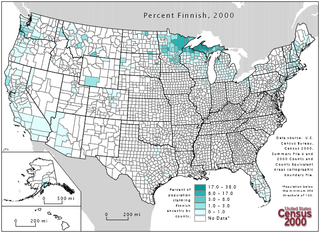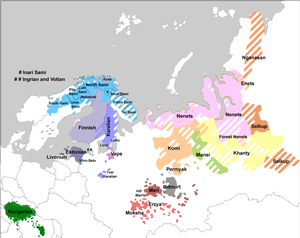American Finnish
This article duplicates the scope of other articles, specifically Finglish. |
| American Finnish | |
|---|---|
| Native to | United States, Canada |
Native speakers | 26,000 (in their homes) United States (2013)[1] 15,295 Canada (2016) |
| Language codes | |
| ISO 639-3 | – |
| IETF | fi-021 |
 Location of Finnish people in America; however, only a few can speak American Finnish. | |
American Finnish, Fingliska or Fingelska is a form of the Finnish language spoken in North America.[2][3][4] It has been heavily influenced by the English language. American Finnish was used actively until the 1950s and after that it has been declining, and Finnish Americans have been switching to English. Even some basic phrases like tätsrait 'that's right' were borrowed from English.[5] The form of speech was studied by Pertti Virtaranta in 1960, and the first American Finnish dictionary was made in 1992.[6] It has influence from English both in syntax and vocabulary.[2] In 2013 Finnish was spoken by 26,000 people in their homes.[1] In the town of Oulu, Wisconsin, there are documented third-generation speakers of American Finnish,[7] and in Stanton Township, Michigan, there are children who speak the language.[8] American Finnish has also retained loanwords from Swedish which modern Finnish lost.[9]
Those in the second and third generations who speak American Finnish are usually bilingual and tend to use English more often. There have been some negative attitudes to "impurities" in American Finnish; however, American Finns usually consider it a language of their own and dislike linguistic purism.[9]
Finnish Americans sometimes have problems understanding Finnish. There is not much areal variation in American Finnish; however, first-, second- and third-generation speakers have more variation in their speech, especially as the amount of English influence differs in generations.[6]
Features
[edit]There are also grammatical differences from Finnish, such as consonant gradation. In American Finnish the letter k remains unchanged, unlike in Finnish: laki 'law', lakit 'laws' (Finnish: laki, lait). And in American Finnish the first person plural ending has often been dropped: me ei saa 'we can't' (Finnish: emme saa). Another difference in American Finnish is that the sound /i/ does not change into an /e/ when conjugated: kieli 'language', kielit 'languages' (Finnish: kieli, kielet).[10]
Vocabulary
[edit]American Finnish has many loanwords from English, but has also retained some older Swedish loanwords that Finnish lost.
| English | Fingelska | Modern Finnish |
|---|---|---|
| bed | peti | vuode |
| blanket | plänketti | huopa |
| kitchen | kyökki/kitsi | keittiö |
| onion | lööki | sipuli |
| telephone | telefooni | puhelin |
| telegram | telekrammi | sähke |
| hay barn | heinä baana | heinälato |
| hospital | hospitaali | sairaala |
| county | kaunti | maakunta |
| farm | farmi | maatalo |
| room | ruuma | huone |
| potato | potaatti | peruna |
| towel | hantuuki | pyyhe |
Grammar
[edit]Cases
[edit]| Case | Fingelska |
|---|---|
| nominative | ruuma |
| genitive | ruuman |
| accusative | ruuman |
| essive | ruumana |
| partitive | ruumaa |
| translative | ruumaksi |
| inessive | ruumassa |
| elative | ruumasta |
| illative | ruumaan |
| adessive | ruumalla |
| ablative | ruumalta |
| allative | ruumalle |
| comitative | ruumineen |
| instructive | ruumin |
In American Finnish the possessive suffixes are rarely used.[9]
Examples of American Finnish
[edit]On heitä enemmän, mutta he ovat nyt muusia hunttaamassa.
'There are more of them, but they are moose hunting.'
fiksata
'to fix'
'Nyt pitää äkkiä koolata Albertille
'Now I have to call to Albert fast.'[2]
See also
[edit]References
[edit]- ^ a b "Detailed Languages Spoken at Home and Ability to Speak English". United States Census Bureau. October 2015. Retrieved March 29, 2021.
- ^ a b c Kolehmainen, Taru (August 13, 2002). "Mihin fingelskaa tarvitaan?". Helsingin Sanomat (in Finnish) – via Institute for the Languages of Finland.
- ^ "Fingelska". Suomisanakirja.fi (in Finnish).
- ^ "Amerikansuomi". Suomisanakirja.fi (in Finnish).
- ^ Pitkänen, Silja; Sutinen, Ville-Juhani (2014). Amerikansuomalaisten tarina (in Finnish). Helsinki: Kustannusosakeyhtiö Tammi. ISBN 9789513183387. OCLC 907686907.
- ^ a b Lindfors, Jukka (September 8, 2006). "Amerikansuomalaisten kieli". Yle (in Finnish).
- ^ Kotkavirta, Johannes (May 28, 2017). "Täällä saunotaan ja puhutaan suomea kolmannessa polvessa – IS vieraili Amerikan Oulussa". Ilta-Sanomat (in Finnish).
- ^ Saarikoski, Laura (December 2, 2017). "Yhdysvalloissa on paikkakunta, jossa joka toisella on suomalaiset juuret – "Pikku-Suomessa" luotetaan Trumpiin ja saunomiseen, mutta tietokoneet herättävät yhä epäilyksiä". Helsingin Sanomat (in Finnish).
- ^ a b c d e Sahlman, Selma Siiri (1949). "The Finnish Language in the United States". American Speech. 24: 14–24. Archived from the original on February 22, 2017. Retrieved March 30, 2021 – via www.genealogia.fi.
- ^ Virtaranta, Pertti; Jönsson-Korhola, Hannele; Martin, Maisa; Kainulainen, Maija (1993). Amerikansuomi. Tietolipas (in Finnish). Vol. 125. Helsinki: Suomalaisen Kirjallisuuden Seura. pp. 97–101. ISBN 9789517177214.


 French
French Deutsch
Deutsch